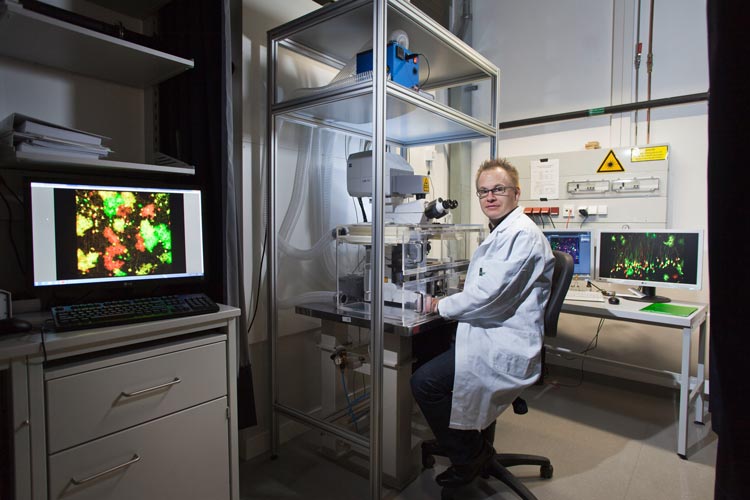September 19, 2014
How genomic imprinting shapes the brain
Success for IST Austria Professor in the Life Science Call of the Lower Austrian Research and Education Company • Simon Hippenmeyer receives support of € 245’000 for three years

Simon Hippenmeyer, Assistant Professor at IST Austria, receives a grant of the Lower Austrian Research and Education Company (NFB). In his project, the neuroscientist investigates the role of genomic imprinting in the development and function of the brain.
For each gene, we possess one copy that we inherited from our mother and one inherited from our father. For a subset of genes, either the maternal or the paternal copy is active. This phenomenon which represents an important gene regulatory mechanism is called genomic imprinting. Genomic imprinting is critical for our development, metabolism and brain function. When genomic imprinting is disrupted, a range of diseases including several neurological and psychiatric disorders like for instance Angelman syndrome (a form of autism) as well as cancer may develop.
Genomic imprinting seems active to varying degrees in different organs and tissues of the body. In the NFB-funded project, Simon Hippenmeyer investigates to which extent genomic imprinting may be restricted to specific nerve cell-types (neurons) in the brain, and what role(s) such cell-type specificity of genomic imprinting could play in the development and function of neuronal connections and networks. By using the recently advanced analytical genetic method called MADM (Mosaic Analysis with Double Markers), the Hippenmeyer group anticipates to obtain unprecedented results at the individual neuron level.
As part of the Life Science Calls 2013, the NFB supports Hippenmeyer’s project “Determination of cell-type specific genomic imprinting in the brain” with € 245’000 for the duration of three years. The NFB-funded project shall provide novel fundamental insights into the role of genomic imprinting in the development and function of the brain. More generally, the project is expected to also advance our understanding of the underlying molecular-genetic basis of neurodevelopmental disorders and psychiatric diseases.
Simon Hippenmeyer is a Swiss neurobiologist. Hippenmeyer joined IST Austria as Assistant Professor in 2012. In his research, Hippenmeyer seeks to understand the logic of how individual neurons successively build up the cerebral cortex during brain development.



